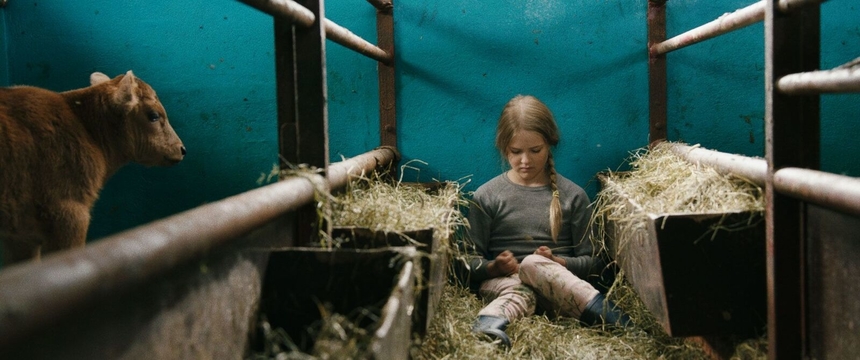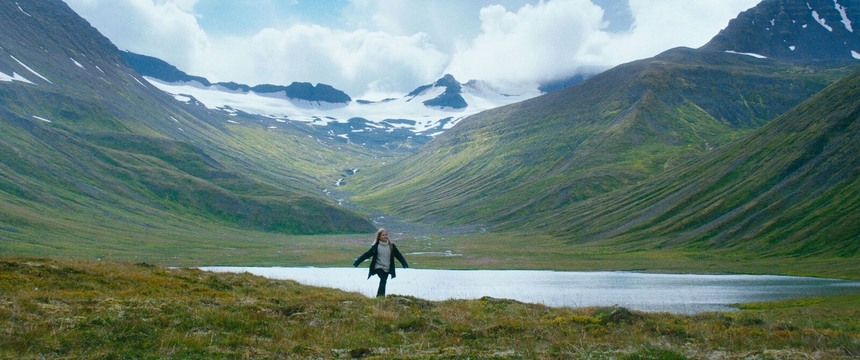Review: THE SWAN, a Lyrical and Sobering Look at Adulthood Through a Child's Eyes
Set in rural Iceland, Ása Helga Hjörleifsdóttir’s debut is an intriguing addition to the coming-of-age genre.

A wilful young girl sent to work on a farm in rural Iceland – a waning traditional Icelandic practice to instill independence in children – uncovers some uncomfortable real-world truths in The Swan (Svanurinn), Ása Helga Hjörleifsdóttir’s serious-in-tone coming-of-age drama based on the 1991 novel of the same name. Milking the country's breathtaking landscapes for all it’s worth, The Swan is a visually stunning product, though at its centre is a more familiar storyline that gently and lyrically probes the sobering realities of early adulthood through the lens of a sensitive child.
After being caught for shoplifting, nine-year-old Sól (Gríma Valsdóttir) is uprooted from her coastal home to spend the summer at a countryside farm owned by her aunt Ólöf (Katla M. Þorgeirsdóttir) and uncle Karl (Ingvar Eggert Sigurðsson). Homesick, lonely and tasked with performing routine farm chores, Sól seeks solace in the roaming animals around her, as well as brooding farm worker Jón (Thor Kristjansson), whom she gradually develops an inchoate infatuation with. Soon, Ólöf and Karl’s troubled, feisty daughter Asta (Þuríður Blær Jóhannsdóttir) returns home from university, carrying with her personal baggage, a litany of caustic remarks and a hushed romantic past with Jón.
Hjörleifsdóttir sets The Swan against a backdrop of azure blue oceans, rolling hills, green pastures and misty mountains – a less-visited part of Iceland in all its rugged, unspoilt beauty. The vast wilderness of this rural environment draws out Sól’s isolation and loneliness, but at the same time, provides the young girl creative latitude to make up her own whimsical parables that are relayed through voiceovers. These tales often contain twisted endings – a girl who swims to the bottom of the sea ends up being strangled by seaweed, while another character who lazes on the grass finds herself sinking into the earth.
Sól’s not the only one who enjoys telling stories; her roommate Jón is an aspiring novelist who spends every night feverishly journaling in their shared quarters. And Asta chimes in with a legend of her own: a monster who lives in a lake on the mountains can transform into a beautiful white swan – hence the title of the film – to lure humans into the water to drown.
Foregrounded in elements of storytelling and mythology, The Swan is an Icelandic riff on the classic Alice In Wonderland fairytale, as Sól navigates a terrain where human relationships and the natural environment are closely intertwined. A keen observer of her surroundings and the individuals within, Sól encounters, in both indirect and direct ways, her first brushes with birth, death, love, desire and jealousy, including learning the harsh truth about the natural order of the food chain, where farm animals merely exist to be consumed.
Gríma Valsdóttir puts in a remarkably textured and restrained performance as the young protagonist, whose steely demeanour and wary gazes initially make her a tough nut to crack, while the dark twists in her stories demonstrate a perceptiveness not yet fully realised. It’s only in her softer, uninhibited moments however, that capture the true extent of the preteen's wide-eyed naiveté, like when the young calf whose birth she assists in is set to be slaughtered. “Take one last look at the world,” cries Sól, as she hugs the animal in an achingly pure display of childhood innocence. While some of these scenarios are more cliché rite-of-passage markers, Valsdóttir presents her emotions in such believably understated ways that she never comes across as pretentious.
On the other hand, the motivations of her companion Jón are never made quite clear over the film's course. A mystery in his own right, Kristjansson succeeds in straddling the dual personas of wise brother figure and creepy grown man, getting too close to comfort when he snuggles up to Sól in the same bed.
More mood piece than gripping epiphanic drama, The Swan is unfortunately let down by a strange, hastily-delivered climax that provides little answers to the characters’ fates. Still, Hjörleifsdóttir’s flourishes of lyricism make this film an intriguing addition to the coming-of-age genre, with the narrative occasionally punctuated by dreamy camerawork whenever Sól’s imagination takes flight, and lines of poetic dialogue that speak volumes about the reality of the adult world.
“It’s important for people who want to tell good stories to pay close attention to nature…because nature never asks for permission,” Jón whispers to Sól one night. Such sentences, together with the allegorical mountain myth of the disguised swan, prime a young child for a murky future of deceit, heartbreak and regret – one where the human heart is as arbitrary as the elemental laws of nature.
The Swan is now playing in New York City at the Village East Cinema. It will open in Los Angeles at the Laemmle Royal on August 17.

Svanurinn
Director(s)
- Asa Hjorleifsdottir
Writer(s)
- Guðbergur Bergsson (novel)
- Asa Hjorleifsdottir

Do you feel this content is inappropriate or infringes upon your rights? Click here to report it, or see our DMCA policy.






